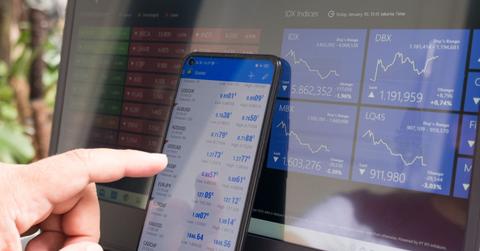Unique Tax Advantages of Trading Futures Contracts, Explained
Futures contracts have unique tax advantages that traditional stock trading can't provide. Here’s the rundown so you can plan your capital gains taxes.
May 31 2022, Published 11:06 a.m. ET
U.S. taxpayers were hit with major capital gains tax bills for the 2021 calendar year. A&I Financial Services president Karl Frank said, “Last year’s tax gains were brutal,” and he’s right. American households paid $522.1 billion in taxes this year, a jump from the previous year’s $243.1 billion — and the leap reportedly traces back to non-paycheck taxes like capital gains, dividends, and interest. As an investor, one way to manage capital gains taxes is by utilizing futures contracts.
A type of derivative contract for investing, futures have unique tax advantages compared to other methods of trading.
Quick rundown: What is futures trading?
Futures contracts let you buy or sell an asset on a set date for a set price. Like options contracts, futures require a buyer and seller to take part in the transaction. However, they differ in one key way. Options contracts become worthless at expiration, but futures contract deals are required to go through.
Here's how futures contracts and their tax benefits work.
Regular stock trading invokes short-term capital gains taxes (for securities held under one year, taxed at the ordinary income rate) and long-term capital gains taxes (for securities held a year or more, taxed at zero, 15, or 20 percent depending on income).
Futures tax rates are more advantageous. Futures follow the 60/40 rule, which means the U.S. taxes 60 percent of trades at the long-term capital gains tax rate of 15 percent, while taxing 40 percent of gains at your ordinary income tax rate. This is huge for investors who do a lot of short-term trades.
Futures trading still maintains a $3,000 limit for capital loss write-offs, which can be helpful in harvesting tax losses over the year.
Perhaps most interesting is the fact that futures contracts aren't bound by wash-sale rules. According to the SEC, “A wash sale occurs when you sell or trade securities at a loss and within 30 days before or after the sale you: Buy substantially identical securities, acquire substantially identical securities in a fully taxable trade, or acquire a contract or option to buy substantially identical securities.”
The IRS doesn’t let you claim losses for wash-sale trades. Futures are exempt from this wash-sale rule, which means active traders can maximize their earnings without being dinged by the IRS.
What to know before delving into futures trading
Like options contracts, trading futures contracts can be complex. Investors should have a thorough understanding of the process before diving into it. They should also begin with a limited amount of funds and grow their account as they become more comfortable and confident.
You should avoid buying your futures contracts on margin (borrowing from your broker to execute the trade). This is risky and can result in debt from losses. Regardless of the outcome of the investment, you’ll still have to repay the broker.
All things considered, futures trading can be lucrative as part of a larger investing strategy. Do your due diligence and explore different types of investing to maximize your productivity.


